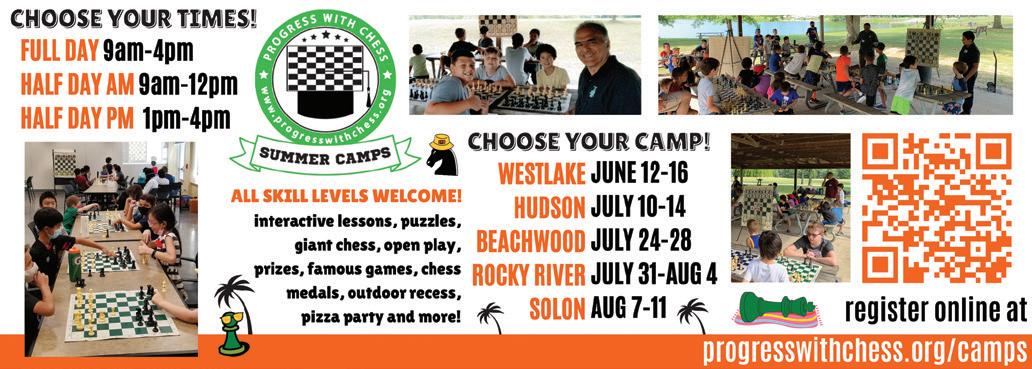
3 minute read
�� �� E B X U m �� e DAYCAMP DECIDER:
from Northeast Ohio Parent | April 2023
by Mitchell Media LLC: Northeast Ohio Parent & Northeast Ohio Thrive/Boomer
Questions parents are asking when deciding on a day camp
By Aisha Taylor
It seems like the school year just started, but it’s quickly coming to a close. It’s time for parents to begin making the final decisions about where to send their children to camp. There are many amazing camps in the area and parents may need to make tough choices. So how do you do it? Parents first need to know the camp hours so they can understand whether a program works for their schedule. Their schedule will help to determine whether they select a full-day or halfday program or a program that offers before and after care. It’ll also help parents to identify which weeks and how many weeks during the summer they need camp.


What will the children learn and experience?
Once families know whether the camp works for their schedule, they need to understand the experience they will receive at the camp.
Hunter Hammil, outdoor adventure camp manager at Nature Center at Shaker Lakes recommends parents ask two questions to help guide their decision, “What’s the reason for sending the kids to camp” and “What experience do they want the children to have?”
“What parents want their child to get out of it will have a lot to do with where to send their child,” he says.
This will help parents decide on an outdoor vs. indoor camp, a speciality camp where they learn a skill, a sports camp, a special interest camp, etc.


How do camps ensure safety?
Evaluating program safety includes how the staff are trained and the policies and procedures involved to ensure child safety, conflict resolution between campers, as well as safety protocols for water activities.
Staff training goes beyond knowing if they are trained. “Parents should know who does the training,” Hammil says. “Is a well-known, reputable company training the staff? The camp should be able to provide certifications and documentation of the training. This is really important if there are activities that could be a little more dangerous if proper procedures aren’t followed.”
Another consideration of safety, according to Natisha Bowling, VP of Youth Development at the YMCA of Greater Cleveland, “is the ratio of children to counselors and whether the counselors are youth or adults.”
What should I consider about water activities?
If there are water activities, parents should find out how much water time the children will have, the ratio of counselors to children in the pool, as well as any accommodations for non-swimmers.
For example, if your goal is to have your child learn how to swim, then you may want to choose a camp with more swimming time. If your child doesn’t know how to swim or doesn’t want to swim, then are there different activities the child can do during the pool or water activity time? If the child is a non-swimmer, but wants to get in the pool, does the camp have accommodations for the child to wear a life vest and remain in the shallow end?
Water activities extend beyond the pool. Some camps have water sports or use water equipment. In those cases, Hammil suggests parents ask, “How often is it inspected? Are the life jackets up to date? How often do they replace and inspect the life jackets?”
What about the age groups?
When parents review camps they will notice that some camps are mixed age groups while others separate the children by age or grade. It’s important to understand your child’s maturity level, development, interests, and goals for the summer when deciding between a mixed age camp or not. Parents should also consider how the camp tailors learning and activities around the children’s age, development, and skill level.
Some mixed age group camps have time where the children are in smaller groups with their peers who are at a similar level of development. Therefore, if the program is a mixed age camp, will the children have time during the day when they are paired into groups according to their age, grade, or developmental level or are the ages mixed the entire time?
What if it rains?
Rain has the potential to disrupt programs where children spend a majority of the time outdoors. When deciding on your camp program, ask:
• Will the children still play outside if it rains? If so, under what conditions?
• Is there a dedicated indoor space for the children to play if it rains?
• How does the camp structure indoor activities so children can have as much fun indoors as outdoors?

What if your child has special needs or allergies?
Hammil encourages parents of children who may need special accommodations to “talk with the camp director. Then the director can explain the program, decide if this is something they can work with, or if it is more than what the camp is capable of providing.”

What about costs?
��Bowling advises parents to “consider the program cost and then weigh that against what is included in the program and what children will gain from the experience.”
Once you weigh your decisions, there are opportunities from scholarships to savings plans to help for day camp costs, if needed.
For example, parents have the opportunity to apply for the Ohio Afterschool Child Enrichment (ACE) Educational Savings Account program, which provides families who qualify with a $500 credit for learning activities such as day camps.
While the cost is an important part of the decision-making process, because the summer camp needs to be affordable, it’s also making sure it’s the best fit for your child.











